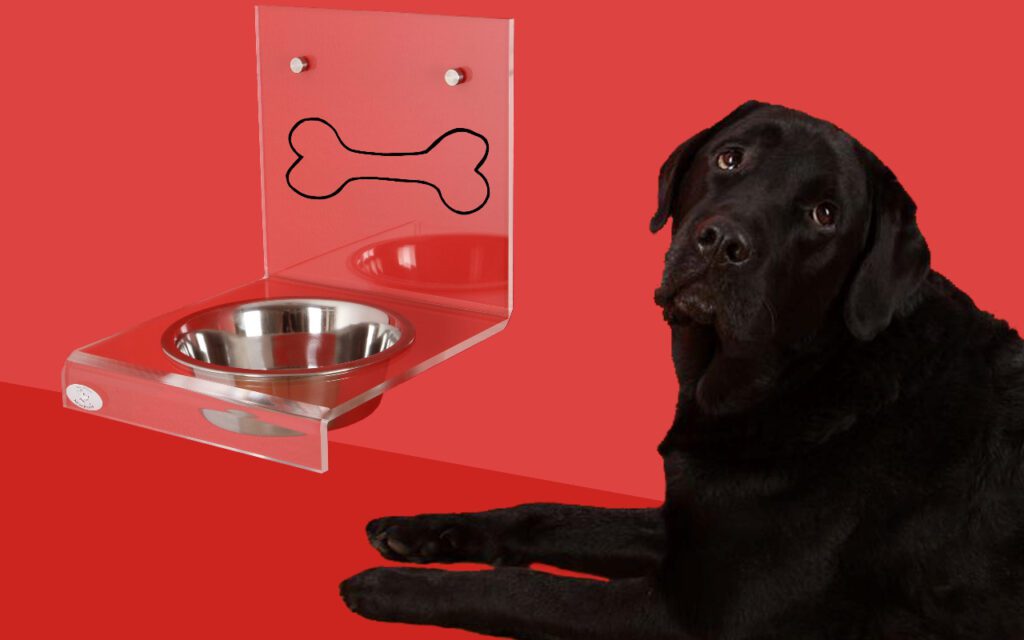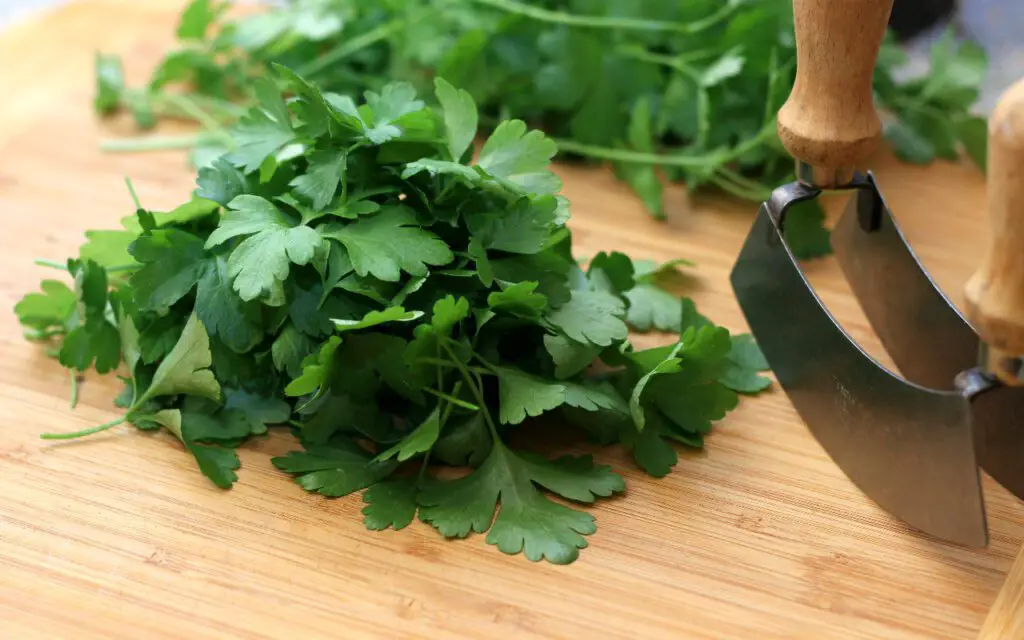Parsley is an edible herb that has many health benefits for humans, but can it also be beneficial to our canine companions?
The answer is yes – in moderation.
Parsley contains several vitamins and minerals that are essential for a dog’s well-being, such as vitamins A, B6, C, and K.
Read on to find out more about how can dogs safely consume parsley.
- Can Dogs Eat Parsley?
- How Much Parsley Can Dogs Eat?
- How Often Can Dogs Eat Parsley
- Health Benefits of Parsley To Dogs
- Nutritional Benefits of Parsley For Dogs
- Are Dogs Sensitive To Parsley?
- How To Prepare Parsley For Dogs
- How Fast Will Dogs Digest Parsley
- FAQs
- Can I Put Parsley In Homemade Dog Food?
- In Conclusion
Can Dogs Eat Parsley?

Yes, dogs can eat parsley (both fresh and dried). In fact, it can be a great addition to your pup’s diet as parsley has many health benefits including being rich in vitamins A and C and having anti-inflammatory properties.
It also aids in digestion, helps keep breath fresher, and provides antioxidants.
When feeding your pup parsley make sure to chop it up into small pieces so that they can easily digest it. Also, avoid the stems since they are harder for them to chew through.
It is safe for dogs to have a small amount of fresh or dried parsley added to their meals occasionally but try not to overfeed it since too much could cause problems with their digestive system.
Top 10 Safe and Healthy Seasonings For Your Dog
Can Dogs Eat Parsley
How Much Parsley Can Dogs Eat?

In general, you should feed your pup no more than 1 teaspoon of finely chopped fresh parsley per 10 pounds of body weight once or twice per week. For example, if your dog weighs 20 pounds, then it can safely eat up to 2 teaspoons of freshly chopped parsley once or twice a week.
Parsley is a safe and healthy snack for your pup! When it comes to quantity, there’s no hard-and-fast rule for how much parsley a dog can eat.
It’s important to note that while parsley is generally considered safe for dogs in moderation, too much can cause digestive upset and other issues.
If your pup shows any signs of an adverse reaction after eating parsley—such as vomiting or diarrhea—contact your veterinarian right away.
Can Dogs Eat Parsley
Parsley Feeding Chart According To Size
| Food | Size | Portion |
|---|---|---|
| Parsley | Toy dogs | 1 tbsp per 10 pounds of weight |
| Parsley | Small dogs | 1 tbsp per 10 pounds of weight |
| Parsley | Medium dogs | 1 tbsp per 10 pounds of weight |
| Parsley | Large Dogs | 1 tbsp per 10 pounds of weight |
Parsley Feeding Chart According To Age
| Food | Age | Portion |
|---|---|---|
| Parsley | 0 – 6 months | Don’t feed |
| Parsley | 6 – 12 months | Half tbsp |
| Parsley | 12 – 24 months | 1 tbsp per 10 pounds of weight |
| Parsley | 24+ months | 1 tbsp per 10 pounds of weight |
How Often Can Dogs Eat Parsley
Dogs can eat parsley daily as long as their portion does not exceed 1 tbsp per 10 pounds of body weight.
Parsley is generally considered safe for dogs to eat, but it should be served in moderation. It can make a great healthy treat when given as a small topping to their regular meals.
As with any herb, the actual impact on your dog’s health will depend largely on the amount consumed and their level of sensitivities or allergies.
Always consult with your veterinarian prior to introducing parsley into your pup’s diet – even in small quantities – as they may have individual dietary restrictions or needs that you should be aware of.
Can Dogs Eat Parsley
Health Benefits of Parsley To Dogs
- Parsley is a nutritious and flavorful addition to your pup’s diet, as it is high in fiber, vitamins A and C, calcium, iron, and magnesium.
- Parsley has been known to improve digestion by stimulating the release of gastric juices that help break down food. This makes it ideal for older dogs or those with digestive issues.
- Eating parsley helps strengthen bones and teeth due to its high levels of phosphorus and vitamin K, which are both essential for bone growth and maintenance.
- It also has diuretic properties that can help flush out toxins from the body while providing relief from urinary tract infections or other ailments affecting the bladder or kidneys.
- Parsley can also help reduce inflammation and improve joint health; its anti-inflammatory properties make it an ideal choice for senior dogs or those with arthritis.
- The high levels of vitamin A in parsley can help maintain healthy vision and even improve night vision in older pups.
Nutritional Benefits of Parsley For Dogs
| Parsley Nutrition Facts pet 100 grams | % DV * |
|---|---|
| Calories | 36 |
| Total Fat | 0.8 g |
| Cholesterol | 0 mg |
| Sugar | 0 mg |
| Glycemic Index | 0.9 |
| Sodium | 56 mg |
| Carbs | 6 g |
| Protein | 3 g |
| Vitamin D | 0% |
| Calcium | 13% |
| Iron | 34% |
| Pottasium | 554 mg |
Can Dogs Eat Parsley
Are Dogs Sensitive To Parsley?
Yes, some dogs are sensitive to parsley. While it is not toxic and can be used to flavor foods or as a garnish, parsley should not be given to dogs in large amounts.
Ingesting too much of it can cause an upset stomach and digestive issues.
Additionally, the stems, leaves, and oils from parsley contain compounds that could be dangerous for your pet if ingested in high doses.
It’s always best to consult with your veterinarian before giving your dog any type of herb or plant.
How To Prepare Parsley For Dogs
Parsley is an excellent way to add flavor and nutrition to your canine companion’s meals.
With these methods for preparing it, you can ensure that Fido enjoys its meal while also receiving all the amazing health benefits of this herb!
Chopping
To prepare parsley for your pup, start by washing and drying the leaves thoroughly. Then, using either a knife or an herb chopper, cut the leaves finely. This way, it will be easier for your pup to eat without having large chunks of parsley in their food.
Mincing
Another good way of preparing parsley for Fido is mincing it with a small pair of scissors or a mini-food processor. Cut the leaves into very small pieces until they become almost like a paste. This method is ideal if you’re adding parsley to homemade dog treats as it helps spread the flavor evenly throughout the treat.
Grinding
For pets who don’t like the texture of chopped parsley, grinding it in a spice grinder is another option. This will turn the leaves into a powder that can easily be mixed into food. Just keep in mind that you should not grind too much as this could lead to your pup ingesting too much parsley at once.
How Fast Will Dogs Digest Parsley
The amount of time it takes for a dog to digest parsley depends on the individual dog, its size, and how much parsley it has consumed.
Generally speaking, smaller dogs will digest parsley faster than larger breeds.
The average digestion rate for parsley is around eight hours, but this can vary depending on the breed and other factors.
Additionally, if the parsley was cooked before being fed to your pup, then they may be able to digest it even more quickly due to the easier-to-digest nature of cooked food.
To ensure that your pup is getting all the essential vitamins and minerals from their diet containing parsley, make sure that you’re only feeding them fresh or frozen (unsalted) parsley.
FAQs
Can I Give My Dog Parsley For Bad Breath?
Yes, you can give your dog parsley for bad breath! Parsley contains a compound called chlorophyll which helps to neutralize odors like bad breath.
It also has antibacterial and antifungal properties that can help fight off bacteria causing bad breath. Plus, it’s high in vitamins and minerals that help support overall health.
To give your pup parsley for their bad breath, simply chop or grind up some fresh parsley leaves and mix them into their food. You can also steep parsley in boiling water to make a tea that your dog can drink.
However, remember not to overdo it as too much of anything is not good for your pet! Additionally, if your pup’s bad breath persists, please consult your veterinarian as there may be an underlying health issue contributing to the bad breath.
Can I Put Parsley In Homemade Dog Food?
Yes, parsley can definitely be added to homemade dog food! Parsley is a nutrient-dense herb that adds valuable vitamins and minerals to your pup’s diet.
It also helps with digestion and supports healthy kidney and liver function. Just be sure to use fresh or dried parsley, as the canned version contains extra sodium.
Additionally, it should only make up 10% of the total ingredients in your recipe so as not to upset your pup’s stomach—and always consult with your vet before making any major dietary changes for your pet.
Enjoy creating nutritious meals for your furry friend!
In Conclusion
Parsley is a healthy herb for dogs and can be consumed daily.
If you are only just introducing parsley into your dog’s diet, make sure to monitor their reaction at the beginning.
Related articles:
- Can Dogs Eat Basil? Fresh or Dried, Find Out Now!
- Can Dogs Eat Cinnamon? Explore The Benefits and Risks
- Ginger Woof! Can Dogs Eat Ginger?
- Can Dogs Eat Turmeric? The Super Spice For Dogs!
- Can Dogs Eat Thyme? The Perfect Addition To Your Dog’s Meal
- Can Dogs Eat Sage? How This Superfood Benefits Your Pooch
- Can Dogs Eat Oregano? The Oregano Debate
- Can Dogs Eat Rosemary? Explore The Benefits of This Pet-Friendly Herb
- Can Dogs Eat Mint? Freshen Up Your Pup’s Breath





Leave a Reply